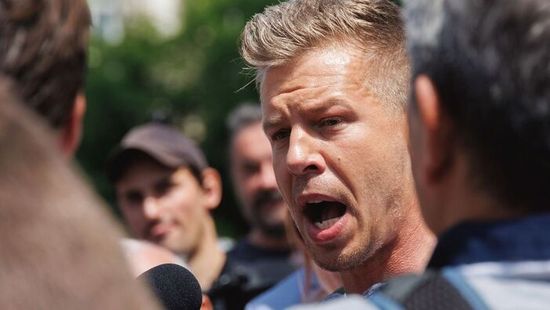Rejtélyes hálószobai fénykép: az elemző szerint Magyar Péter magára húzta a bajt

Nagyító alá tettük a Tisza elnökének drogos bulija körüli botrányt.

Then Russia invaded Ukraine, and I came to see just how dangerous a propaganda tool the network was. I couldn’t be a part of it any longer.
„I was disgusted and disappointed by the whitewashing of brutal dictators—and glad to be covering domestic issues. I tried to pitch stories I felt were important and underrepresented. From time to time, I would report on something I found worthwhile, and feel a little better about the cognitive dissonance I was suffering from. I went inside the country’s largest jail in Cook County, Chicago, to expose how mental health patients flooded the correctional facility, highlighted the victims of the so-called War on Drugs who were unjustly incarcerated for decades for petty drug crimes and consistently covered the Bradley Manning trial in Fort Meade, Md. But I knew the stories would only fly if they fit the network’s narrative that America is a crumbling nation plagued with problems. (…)
Throughout my time at the network, I heard colleagues repeat various justifications for continuing to work there ranging from “we’re providing a different perspective,” to “everyone has an agenda” to “it’s a job.” I resolved to only report facts, and I fell out of favor with the Russian managers for pushing back when they wanted me to push an angle I wasn’t comfortable with. (There’s a reason why many of the employees there are young and inexperienced.) (…)

Producers booked clearly pro-Russian, anti-American guests, and I was instructed to egg them on. I was told to play up the extremist elements of the opposition, painting the new government as driven by neo-Nazi nationalists. But I also did my own research, and the more I learned about the uprising, the more my eyes opened to how the network was being used as a tool to push Putin’s agenda. It was a complex situation, sure, but there was at least one simple, irreducible fact: Russia had invaded Ukraine and lied about it.(…)
I stopped to think about who I was and what I was doing. On my father’s side, both of my grandparents were immigrants from Hungary. My grandfather arrived in the U.S. around the end of World War II. My grandmother arrived 10 years later as a refugee from the 1956 Hungarian uprising, a nationwide revolt against Soviet forces that eventually forced Hungary into submission.”